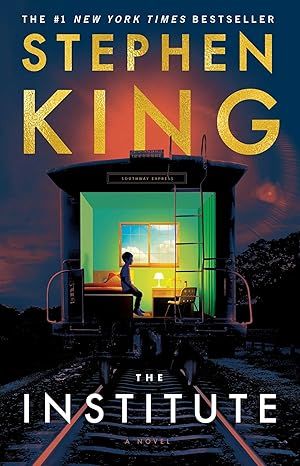The Institute: A Novel
4.6 out of 5
59,683 global ratings
From #1 New York Times bestselling author Stephen King, the most riveting and unforgettable story of kids confronting evil since It. “This is King at his best” (The St. Louis Post-Dispatch).
In the middle of the night, in a house on a quiet street in suburban Minneapolis, intruders silently murder Luke Ellis’s parents and load him into a black SUV. The operation takes less than two minutes. Luke will wake up at The Institute, in a room that looks just like his own, except there’s no window. And outside his door are other doors, behind which are other kids with special talents—telekinesis and telepathy—who got to this place the same way Luke did: Kalisha, Nick, George, Iris, and ten-year-old Avery Dixon. They are all in Front Half. Others, Luke learns, graduated to Back Half, “like the roach motel,” Kalisha says. “You check in, but you don’t check out.”
In this most sinister of institutions, the director, Mrs. Sigsby, and her staff are ruthlessly dedicated to extracting from these children the force of their extranormal gifts. There are no scruples here. If you go along, you get tokens for the vending machines. If you don’t, punishment is brutal. As each new victim disappears to Back Half, Luke becomes more and more desperate to get out and get help. But no one has ever escaped from the Institute.
As psychically terrifying as Firestarter, and with the spectacular kid power of It, The Institute “is another winner: creepy and touching and horrifyingly believable, all at once” (The Boston Globe).
576 pages,
Kindle
Audiobook
Hardcover
Paperback
Audio CD
First published August 31, 2020
ISBN 9781982110581
About the authors
Stephen King
Stephen King is the author of more than fifty books, all of them worldwide bestsellers. His first crime thriller featuring Bill Hodges, MR MERCEDES, won the Edgar Award for best novel and was shortlisted for the CWA Gold Dagger Award. Both MR MERCEDES and END OF WATCH received the Goodreads Choice Award for the Best Mystery and Thriller of 2014 and 2016 respectively.
King co-wrote the bestselling novel Sleeping Beauties with his son Owen King, and many of King's books have been turned into celebrated films and television series including The Shawshank Redemption, Gerald's Game and It.
King was the recipient of America's prestigious 2014 National Medal of Arts and the 2003 National Book Foundation Medal for distinguished contribution to American Letters. In 2007 he also won the Grand Master Award from the Mystery Writers of America. He lives with his wife Tabitha King in Maine.
Read more
Reviews
Christopher Carrolli
5
"The Institute" to Become One of King's Best Works!
Reviewed in the United States on February 5, 2020
Verified Purchase
Stephen King, the Master of Horror, has written what will likely become one of his greatest works of all time. Reminiscent of “It,” “Firestarter,” and “Carrie,” “The Institute” is non-stop page-turning fascination that borders on addiction. It is a book easily devoured from the first to the last page.
The story begins as former cop, Tim Jamieson, accepts a generous refund to ditch a flight bound for New York City. Later hitching a ride to South Carolina, Tim settles in the small town of DuPray, where he lands a job as the town’s Night Knocker. A past incident precludes him from becoming a police officer again. As Tim makes DuPray his new home, his story is then put on hold, as the real story begins.
Somewhere in Minnesota, Herb and Eileen Ellis learn that their twelve-year-old son, a brilliant prodigy enrolled at the Broderick School for Exceptional Children, is too smart for the so-called, “special school.” They are perplexed at having to make other arrangements for Luke, who’s also endowed with a touch of telekinesis. He’s able to move objects and flip pizza pans when he gets excited, but it’s nothing extraordinary, not enough for his parents to realize that their child genius is the cause of the strange activity.
Late one night, a team of ex-military soldiers breaks into the Ellis home, where they murder Herb and Eileen and kidnap their son from the safety of his bed. Luke awakens in a room identical to his own, yet different; his bedroom window is gone. Leaving the room, Luke discovers other children, children who reveal to him his whereabouts. Like them, he has been abducted and brought here to the Institute.
Here, King unveils a cast of extraordinary and expertly-crafted characters. Among them are Kalisha, a telepathic girl who reads minds and becomes Luke first and most trusted friend. Nicky is the handsome telekinetic who sports bruises obtained by defending himself from the adults. The adults are those in charge of the Institute, those who torture and punish the children for not conforming to the tests they perform on them. The rigorous and mind-altering tests are meant to enhance the children’s psychic abilities for a greater cause, one that will save the world.
King’s adult characters are as much contemptible despots as the children are loveable heroes, creating a well-balanced cast of antagonists and protagonists. Mrs. Sigsby is the ruthless head of the Institute, greatly feared and hell bent on destroying the children’s minds and bodies to get the desired results. She is the boss of despicable underlings, technicians and doctors well-paid to torment the children by torturous means if needed. Among their goals of enhancement is to produce telepathy in telekinetic children and vice verse. Luke soon realizes that not only is he telekinetic, but he is able to read minds as well.
More children enter the story. Among them is Avery, a ten-year-old super-telepath, who along with the help of Maureen, the one caring adult in the Institute, helps Luke escape. Back in the real world once again, Luke embarks on a journey of survival, one that erupts in mayhem when he tells his story to a Night Knocker in DuPray, South Carolina.
Back at the Institute, fear spreads at the thought of being exposed, imprisoned, or worse. Mrs. Sigsby dares not call her unseen boss on the special phone. In a scene akin to “Carrie” and “Firestarter,” the remaining psychic children gather together and turn their abilities in rage toward the Institute, the result of which is classic Stephen King.
The never-ending and fascinating plot, along with the remarkably real characters places the reader in a new yet familiar world created by King. “The Institute” will fit well on anyone’s list of all-time King favorites.
Read more
12 people found this helpful
Elizabeth Horton-Newton, Author
5
Strong Characters and a Compelling Thriller= A Winner!
Reviewed in the United States on October 31, 2019
Verified Purchase
It’s no secret; I am a big Stephen King fan. (Not like Annie Wilkes though!) I have often said King is my husband’s only competition. He could tell me stories for the rest of my life, and I’d be in ecstasy. There’s no great romance here, just intense appreciation for a well-told tale and a good scare. I waited for the release of “The Institute” with barely controlled anticipation. I’m pleased to say the wait was worth it. Expanding on the theme of “Firestarter,” King presents a secret government branch that tracks children with psychic abilities with an eye toward utilizing them as weapons. If the idea of The Shop bothered you, the Institute will drive you mad. King teases the reader by laying the groundwork subtly. First, he introduces Tim Jamieson. King has a knack for developing his characters and settings slowly. It’s a clever way of getting readers invested in the characters. He arouses curiosity as he leads us along a path, slyly tossing out clues to tantalize. By the end of the first chapter, I liked Tim. I admired his honesty, his thoughtfulness, and most of all, his daring. Tim does what many people might want to do. He picks up and goes on a journey, rather like a Hero’s Journey. But Tim is not the focus of this disturbingly dark tale. Luke Ellis is a child genius. This unassuming twelve-year-old boy has been attending a school for exceptional children. But the principal informs the boy’s parents he has surpassed what the school can offer. Scheduled to take his SAT’s, a challenge most high school students view with trepidation, Luke approaches the test as an opportunity to get into MIT. He sees the promise of a wonderful future stretching before him. However, this is a King novel. Things don’t go that way. Before he can move into college life, Luke’s parents are murdered, and he is kidnapped. Waking in a copy of his bedroom, he is soon ensconced in life at the Institute. Little by little, he makes friends who introduce him to the dark world he has entered. He suspects his parents are dead but doesn’t know for sure. The administrators of the Institute have one focus. Grooming their charges for assignments to benefit the USA and the world. As Luke learns more about the Institute, he is exposed to experimental drugs and procedures. These are just the beginning of horrors yet to come. The children and there are many of them, are disposable resources to their keepers. As Luke and his new friends move deeper into the program, they realize they must fight back or die at the hands of the staff. King’s skill at gathering groups of kids with diverse personalities and uniting them in a common goal is brilliant. The implication that children are stronger when they band together runs throughout this book much as it did in “It.” Together they exhibit courage, determination, and the kind of unity and single-mindedness usually found in the military. But success also relies on the belief of at least one adult, one person who can provide the grown-up status needed to defy the odds. “The Institute” is a chilling take on the corruption in government where the end justifies the means. It is only when we stand together, united for the good, that we can overcome the dark forces that threaten our world. With well-developed characters and a couple of scary settings, “The Institute” is a warning. King does a great job of weaving the real world we live in with the fictional worlds he creates. Governments like to play God. Every one wants to be the big dog, the one with the most control. We need to keep our eyes open and speak up when something is going south. Otherwise, we are complicit in the wrongs that are done in the name of ‘right.’ As an aside, I both read the book and listened on Audible. Either way, it’s a winner.
Read more
20 people found this helpful
Miss Barbara
5
A great character study about people who justify their horrible choices
Reviewed in the United States on September 11, 2019
Verified Purchase
King writes so well about the innocence of kids. He also writes at his best when the subject is pure evil. Slap them together and you have The Institute. The book starts in a simple little town where a cop passing through takes a job as a night knocker. There's a kid, a really smart kid, who's 12 years old and getting ready to attend MIT because he's, you know, special. That's the setting. From there it gets chilling. Even without ghosts, or vampires or outer space boogie men.
The child, Luke, is taken in the middle of the night. His folks are murdered. He wakes up at The Institute in Maine in a room that's just like his - almost. There's other kids there and he gets the skinny from a young girl in the hallway, seemingly smoking a cigarette. She tells him that they "do stuff" to the kids, injections-flickering lights-dunking, but at least they're in the Front Half. You don't want to go to the Back Half. No, that's like the roach motel. Kids go in and don't ever come out.
To say this is a character study of the people throughout history who have told themselves that the horrible, hideous, atrocious things they do are for a "higher good". This book is King at his best. It's tense and I found myself ill at ease throughout the 500 plus pages. But it's good. A good story, good writing, and yeah, sure, it's relevant in the America of today and about our choices.
Read more
1 people found this helpful
Stephen L. Dalton
5
The Institute Depicts Monsters that Aren’t Supernatural
Reviewed in the United States on December 29, 2019
Verified Purchase
Introduction
The Institute depicts monsters that aren’t supernatural, but instead, look just like you and me. In this review, I’ll give an overview of this novel without spoilers while expressing my opinion about his latest thriller.
I have read most of Mr. King’s book, and this can stand toe-to-toe with the best of them. The kids are the heart and soul of this story. Their stories will tug at your heartstrings.
Summary
Mysterious individuals sneak into a home at night and kill the parents of a genius child prodigy named Luke Ellis. These individuals then kidnapped Luke and put him in The Institute in the backwoods of Maine with other kids that also have abilities like telekinesis and telepathy. Now Avery, Iris, Luke, and multiple other children must find a way out of this sinister institute that seeks to exploit their abilities, even though no one has ever successfully escaped before.
Narration
The narration is in the third person by an outside, unknown perspective. It gives great detail on how each character focused on sees the world. For example, the parents of Luke are both proud of and scared for their child. Tim Jamieson, a drifter with a law enforcement background, who takes on the job of “night knocker,” has a pessimistic outlook on the world that gradually brightens the longer he stays in DuPray, South Carolina.
Setting
The book is set in modern-day, as it mentions and takes a few jabs at Donald Trump as the president. This drives the underlying plot about the horror of abducting children and treating them as a means to an end. Stephen King has criticized the Trump administration for inhumane acts for “the greater good,” a similar theme expressed in The Institute. The book, according to The Washington Post Review, calls out “the inhumane treatment of children and the loss of a moral compass for those who inflict it.”
Theme
Just as It and some of his other works, The Institute has a side theme that emphasizes working together can be more powerful than we realize. The Institute also talks about how even the tiniest choices can lead to marvelous possibilities and circumstances.
Genre
The Institute’s genre is “horror.” In fact, The Institute won the Goodreads Choice Award in the Horror category, garnering nearly 40,000 more votes than its closest competitor, even beating out King’s son Joe Hill’s Full Throttle. King’s other works that fall into this genre have shown to have compelling, edge-of-your-seat plots, but this is considered one of his scariest. The horror of the underlying message of this latest work and the possible posers of our government, give readers more chills than killer clowns, vampires, rabid dogs, and ghosts.
Author
Stephen King has shaped a generation with the over fifty books he has sold all over the world. Some of his most famous novels like It, The Shining, 11/22/63, and The Stand, have moved on to other forms of media like movies and television series. Though it has many of the same foundational themes and ideas that King’s other novels have, The Institute tells a different story in a chilling way that will keep you up at night.
Plot
The longer Luke stays in the institute, the more he learns about the sinister system and how it’s structured. Obedient kids are treated with tokens for various treats at a vending machine, while those who aren’t compliant get punished, often severely.
The agents in the institute conduct sordid experiments on the inhabitants to strengthen their abilities, or so it would seem. However, some of the children believe it is just sadistic torture.
My Opinion
Some of the main characters include Luke Ellis, Kalisha, Avery Dixon, Iris, George, Nick, Tim Jamieson, Mrs. Sigsby, and Trevor Stackhouse.
The director, Mrs. Sigsby, is tasked with running cruel experiments on these extraordinary children. If I were casting a movie or TV series for this book, I would choose Linda Hunt “Hetty Lange” from NCIS: Los Angeles to star in her role. Just put her in a red pantsuit and stand back!
I would probably cast Dean Norris, the Town Councilman from Under the Dome as Trevor Stackhouse, the Security Supervisor. You might also remember him playing the drug enforcement agent in Breaking Bad. Likewise, I believe Ryan Gosling would fit the part of Tim Jamieson very well. Just my opinion, of course.
My favorite would have to be Luke Ellis, as he was an enthusiastic and bright young kid who slowly changes. Luke might be played best by an unknown, but I believe Finn Wolfhard, Mike Wheeler in Stranger Things could also pull off the part.
The main characters interact similarly to two people in a chess match: each has to make a move and be able to predict what the other will do. Any of the cast of child actors from Stranger Things would fit right into this story.
If you’re someone who likes to read about the horrors hidden within our society, then The Institute will be a good read for you. I encourage others to read this book, as it makes you think about the world around us as well as what it’s becoming. The initiation of change can’t come without awareness, first.
I’ll happily read more from Stephen King because he tells what seems like regular stories in such a unique perspective that it makes those stories intriguing. I’m one of the “constant readers” who would buy if he published a new book every week.
Read more
67 people found this helpful
Deborah S
5
My brain hurts!
Reviewed in the United States on September 13, 2024
Verified Purchase
Stephen King's brain, on the other hand, just keeps flowing with good stuff! This book is intriguing, suspenseful, thought provoking, and (as usual) keeps you on the edge of your seat!
If they were available, I would give it many more than 5 stars!
Diana Tate
5
Brilliant
Reviewed in the United States on August 17, 2024
Verified Purchase
The Institute sucked me in quickly and took me on a never ending roller coaster. Even though I read the last chapter of the book, the roller coaster continues to glide in my head, what if?
Jackeline
5
He is a master storyteller!
Reviewed in the United States on August 15, 2024
Verified Purchase
I'm more than halfway through the book and I am thrilled with his writing. Good story, disturbing, but that's Stephen king for you. Totally worth the read.
2 people found this helpful
James Tepper
4
Solid Sci-Fi From Stephen King
Reviewed in the United States on September 15, 2019
Verified Purchase
THE INSTITUTE, Stephen King’s latest, tends more towards the sci-fi end of King’s typical sci-fi-horror-fantasy spectrum. Back in the old days, immediately following the release of CARRIE, his first published novel, King started an incredibly long string of critically acclaimed and commercially successful releases that went on for over 20 years. Of course he didn’t stop writing then, but during the 1990s some of his novels didn’t receive the almost universal acclaim that virtually all of his “earlier work did. Since that time, although most of his novels and anthologies still were tremendous critical and commercial successes, every once in a while he released one or two that were less than absolutely terrific, and every once in a great while, a real stinker.
THE INSTITUTE is neither one of the truly classic first 10 or so novels, nor one of the last small group . The novel starts with what is essentially a lengthy prologue, in which we are introduced to ex-cop Tim Jamieson, who makes a snap decision to give up his seat on a flight from Tampa for$2000 and decides to hitchhike north. He ends up in Dupray, SC, and we meet a bunch of the locals in this tiny very southern town
Then the real novel begins. The principal protagonist is 12 year old Luke Ellis, who has weak telekinetic abilities. Luke is also however, off-the-charts brilliant, a veritable polymath genius. Luke is kidnapped in the middle of the night, drugged, his parents murdered, and he is whisked away to a strange facility in the middle of Maine (of course) where kids are subjected to strange tests and/or treatment in the “Front Half” of the eponymous Institute for several weeks or months until they are sent to the “Back Half”, after which they are never heard from again. They whys, whos, hows and wherefores of the Institute remain unclear and quite puzzling for quite a while. Luke becomes something of a leader of the others in trying to figure out what the hell is going on and how the hell they can escape from sadistic doctors and caretakers and painful and seemingly pointless treatments.
King has always had a penchant for plotting, dialogue and pacing – some of the things that make a writer great. In that regard, THE INSTITUTE is no exception. He also writes interesting characters, with special skill for creating childred, especially ones that are unusual, somewhat nerdly, damaged and/or clever, and THE INSTITUTE has these in abundance.
THE INSTITUTE is not scary in the way that PET SEMATARY or IT was. It’s similarities to FIRESTARTER are greater than the centerpiece of paranormal abilities and include the good guys being chased by agents of some shadowy black ops organization. This generates a lot of tension and this tension and anxiety, along with not knowing what the hell is really going on drives much of the novel.
Even after finishing the novel, I still cannot figure out why the Institute staff treated the kids so sadistically. There didn’t seem to be any reason for it. On one hand, in the Front Half the kids had nice rooms, a choice of freshly prepared tasty meals and fresh fruit and snacks available. On the other hand, the staff slapped and beat the kids, gave them painful shots other torture-like treatments, and were generally just plain mean to them. Another complaint was that the “dots” were never explained. I still don’t know what they were or what their effects were. The reason behind what the staff was trying to do in both halves was clear enough, but not the logic or the purported mechanisms. There is a Kingly twist at the ending that I liked.
Finally for those who get all bent out of shape about King’s liberal politics (which has always mystified me), while he does not turn into huge Trump supporter in the INSTITUTE, I’d like to point out that the various citizens of Dupray are depicted as Southern as all get out, but with great fondness and respect for the Southern way of life. And if it were not for the fact that almost all of the 1300 residents owned and were not afraid to use guns, lots of them, this novel would have been a lot shorter and had a much different ending.
Recommended.
JM Tepper
Read more
31 people found this helpful
Josh Mauthe
4
It won't leave much for you to chew on, but it's still a great, compulsively readable thriller
Reviewed in the United States on September 20, 2019
Verified Purchase
I've been accused of being predisposed to like everything that Stephen King wrote, and while I don't think that's entirely true, I think it is true that it's hard for me to think of many King books that I didn't enjoy reading. That's not the same as saying they're all good books (not when you have a Dreamcatcher, a Tommyknockers, or a Gerald's Game in the mix), but what it is saying is that King is too accomplished an author, too good of a storyteller to not have something appealing about the way he's spinning his stories. And even when the story is a bad one, immersing yourself in King's conversational prose, expert pacing, and gift for unease and horror is all but guaranteed to lead to a fun read, even if it ends up being unsatisfying.
None of which is to say that King's newest, The Institute, is a bad book. Indeed, The Institute is a perfectly fun, entertaining read - not on a par with King's best work by a long shot, but far from his worst. It's a solid, engaging story, well-told as usual and paced with King's usual intensity and gift for buildup. It's just that, by the time you finish, you realize there's not much meat on these bones, and more frustratingly, you can see the chances where there could have been that substance...but instead we got a solid little B-movie thriller with head nods towards something more.
After a (surprisingly lengthy) prologue involving a small-town cop, The Institute settles into its main story: the titular organization, which has been abducting children who show signs of telepathic and telekinetic abilities, no matter how weak they might be. So when genius teenager Luke Ellis winds up here, it's not his intellect they want him for; it's more about those odd times that doors move without him ever touching him. But Luke's intelligence leads him to start poking holes in the stories about the Institute and result in him trying to figure out exactly what's going on in the Back Half of the building, into which kids disappear and don't come back.
The reason for all of this remains unsaid for quite some time, and ultimately, that explanation is one of the more compelling and unexpected aspects of The Institute - it's not the exact reasons King leads us to assume, and it's one that could have led to some thoughtful moral calculations. Instead, The Institute is more about trying to rebel in the face of unfathomable moral cruelty, in which children are mistreated and abused in the name of some greater good and without ever being acknowledged as human beings. (Luckily, there are no modern-day or contemporary parallels here at all. Nope.) Essentially, it's a prison break book - The Great Escape with psychic children, if you wanted to be reductive about it.
And that's not necessarily a bad thing! Few authors handle pacing as well as King, and there are some great setpieces here, from the slow unfolding of an escape plan to a showdown in a small town to the unveiling of the true power of some of these kids. And those treatments? They're intense and horrifying, raising the specter of "enhanced interrogation" methods committed in the name of a greater good without ever making that connection explicitly clear. All of that leads to some deeply despicable villains whose comeuppance becomes something I truly needed by the end of it all, and some characters who I genuinely wanted to see get through all of this okay.
Still, I'm a few days out from finishing The Institute now, and my main thought is "Yeah, that was pretty good." There aren't many chances taken here, and little new ground broken. There's nothing here like the ambition and power of 11/22/63 or the horrors of the end of Revival; instead, you're getting a solid little thriller, one that's well-told and incredibly engaging, but won't really leave you much to chew on. But when the book is still as compulsively readable as this one is, I don't think that's the worst thing in the world.
Read more
4 people found this helpful
SkekTek
3
Good read, flawed story.
Reviewed in the United States on July 16, 2024
Verified Purchase
The Institute is a brisk and enthralling read where the story pulls you along at a constant pace. There are no King-type lulls of exposition. Well, there is one with the introduction of Tim Jaimeson, but that occurs at the very beginning, and is forgivable.
I don’t regret the read, but Stephen King has done far better (Spoilers ahead).
The Institute exists for 2 reasons: 1) To divert humanity from any number of civilization ending calamities, and 2) Give King a justifiable reason to abuse children (for our horrified entertainment). The Institute is only dubiously successful on these two fronts.
My biggest gripe with the bones of this story is that The Institute itself is dumb, not the book, but the well intentioned but ultimately malevolent organization within the book. I'd love to attribute it to hubris, institutional overreach, bureaucratic stagnation, or some other inevitable in-world consequence but I think Stephen King’s ability to effortlessly spin yarn makes him apathetic to the viability of his weaves.
When we arrive at The Institute we see a dwindling organization; operating at a fraction of its intended capacity. For decades they’ve systematically culled BDNF gifted offspring from the population (BDNF is a biological quality that is essential to the functional operation of the program). You don’t have to be a “precog” to see that it wasn't sustainable. Why did they run all the candidates into the ground instead of breeding some subset to create more, and better qualified, candidates? Why didn’t one of the precogs in The Institute’s 70+ year history foresee the crash of the BDNF population, or the fall of The Institution itself? After all, that’s the entire point of the “precogs”; to see the future and prevent such disasters.
There are several nonsensical details about the story that I wanted, no hoped, that King would justify, but it just never happens. Stephen King has described his story creation process as a box full of unfinished cups. Every once in a while he finds a handle and joins it to a cup, and viola! a story is born. This isn’t King’s worst ending; there’s retribution and redemption which is cathartic, but it’s also predictable and uninspired (even forgiving the exposition dump in the final pages, which only served to reinforce how shortsighted and inept The Institution was). King should have capitalized on the implied righteousness of The Institute that is subtly hinted at throughout the story. The Institute should have concluded with the onset of The Stand, adding a bittersweet twist to the protagonist's victories.
'Three weeks after the fall of The Institute and its questionable protections, a young soldier, AWOL and gripped by panic, races home through the Texan desert. “Wake up now, Sally. Wake up.” He shook her hard. “You got to wake up!” Sally swam up out of sleep. “Charlie, what is it? What’s wrong? Is it a fire?” she asked stupidly. “In a way.” he said. “In a way it’s worse. Get Baby LaVon. We got to get out of here.”'
Read more
Top Stephen King titles
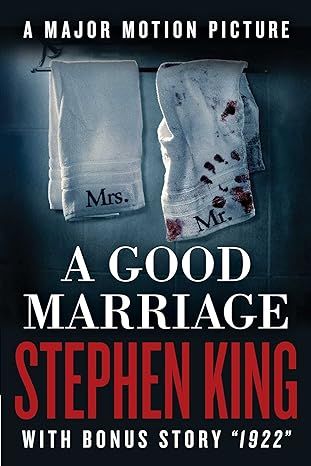
A Good Marriage
4.1
-
5,995
$4.99
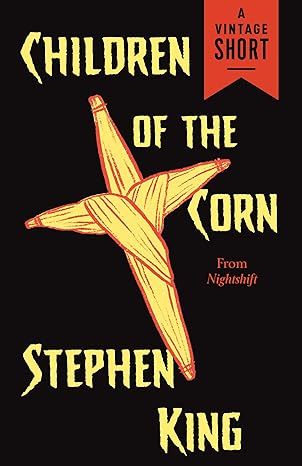
Children of the Corn (Kindle Single) (A Vintage Short)
4.3
-
1,084
$0.99
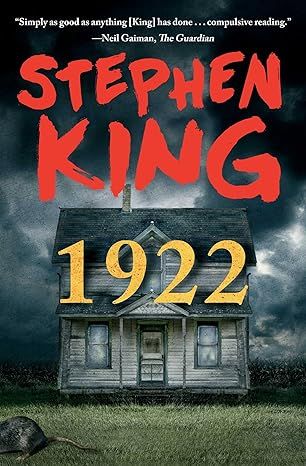
1922
4.6
-
6,082
$7.99

UR
4.3
-
6,140
$3.99
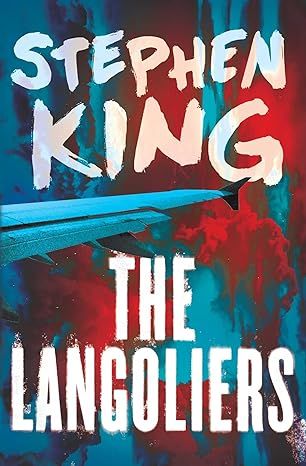
The Langoliers
4.6
-
1,014
$6.49
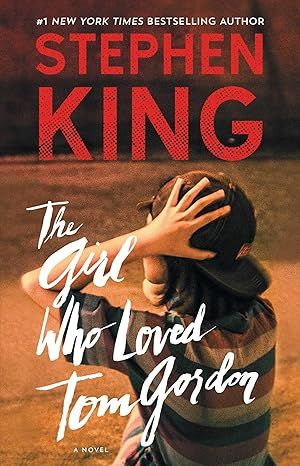
The Girl Who Loved Tom Gordon: A Novel
4.5
-
4,774
$1.17
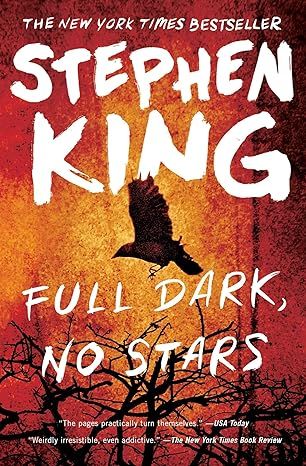
Full Dark, No Stars
4.6
-
6,762
$5.00

Gwendy's Button Box: A Novella (Gwendy's Button Box Trilogy Book 1)
4.5
-
21,335
$3.88
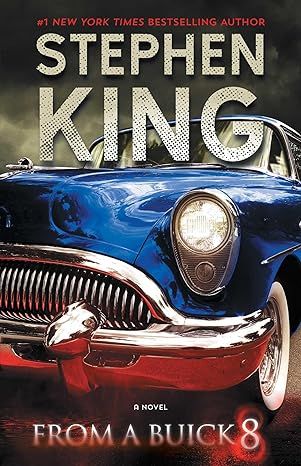
From a Buick 8: A Novel
4.3
-
2,174
$11.99
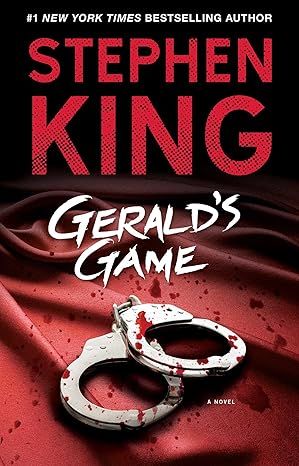
Gerald's Game
4.2
-
3,838
$1.97
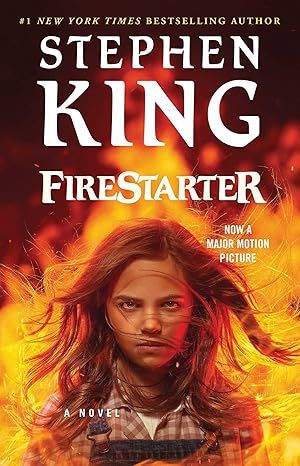
Firestarter
4.6
-
5,489
$9.99
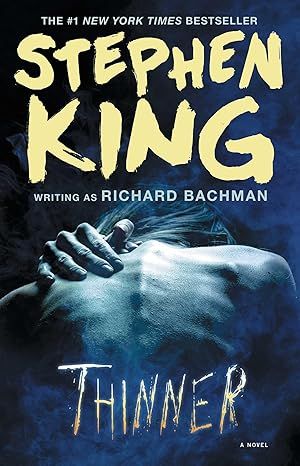
Thinner
4.5
-
3,107
$2.50
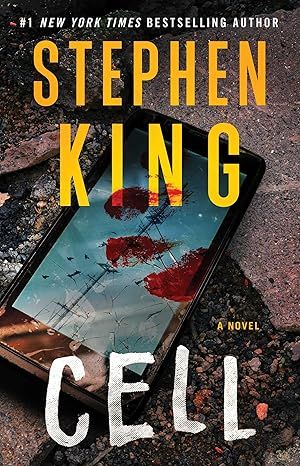
Cell: A Novel
4.3
-
5,196
$3.31
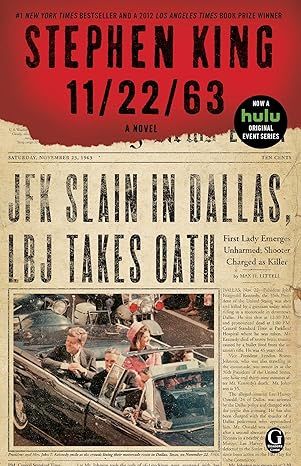
11/22/63: A Novel
4.6
-
11,307
$11.99
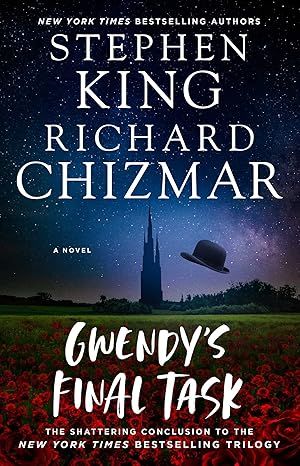
Gwendy's Final Task (3) (Gwendy's Button Box Trilogy)
4.6
-
8,788
$7.87
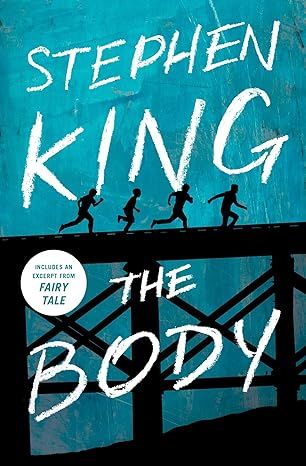
The Body
4.7
-
4,496
$10.48
Best Sellers

The Tuscan Child
4.2
-
100,022
$8.39

The Thursday Murder Club: A Novel (A Thursday Murder Club Mystery)
4.3
-
155,575
$6.33

Sapiens: A Brief History of Humankind
4.6
-
140,302
$13.49

The Butterfly Garden (The Collector, 1)
4.3
-
88,556
$9.59

Things We Hide from the Light (Knockemout Series, 2)
4.4
-
94,890
$11.66

The Last Thing He Told Me: A Novel
4.3
-
154,085
$2.99

The Perfect Marriage: A Completely Gripping Psychological Suspense
4.3
-
143,196
$9.47

The Coworker
4.1
-
80,003
$13.48

First Lie Wins: A Novel (Random House Large Print)
4.3
-
54,062
$14.99

Mile High (Windy City Series Book 1)
4.4
-
59,745
$16.19

Layla
4.2
-
107,613
$8.99

The Locked Door
4.4
-
94,673
$8.53
